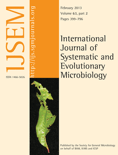
INTERNATIONAL JOURNAL OF SYSTEMATIC AND EVOLUTIONARY MICROBIOLOGY
Scope & Guideline
Connecting Researchers to the Microbial Frontier
Introduction
Aims and Scopes
- Taxonomy of Prokaryotes and Fungi:
The journal primarily publishes research on the classification and naming of bacteria, archaea, and fungi, contributing to the understanding of microbial diversity. - Phylogenomic Studies:
Phylogenomic analyses are commonly employed to investigate the evolutionary relationships among microorganisms, providing insights into their classification and ecological roles. - Novel Species Descriptions:
A significant focus is placed on the identification and formal description of new species, which enhances the existing taxonomic frameworks and promotes biodiversity research. - Ecological and Environmental Microbiology:
Research often includes the ecological implications of microbial species, especially in relation to their environments, such as soil, water, and host-associated microbiomes. - Genomic and Metagenomic Approaches:
Studies utilizing genomic and metagenomic techniques to explore microbial communities and their functions are also prevalent, reflecting modern trends in microbiology.
Trending and Emerging
- Metagenomics and Microbiome Studies:
A significant trend is the rise of metagenomics, with studies focusing on the characterization of microbial communities in various environments, emphasizing their ecological roles and interactions. - Phylogenetic and Phylogenomic Analyses:
An increasing number of publications employ advanced phylogenetic and phylogenomic methods to resolve taxonomic ambiguities and refine the classification of prokaryotic taxa. - Environmental Microbiology and Bioremediation:
Research on the ecological impacts of microorganisms, particularly in bioremediation and environmental sustainability, has gained momentum, reflecting global environmental concerns. - Microbial Diversity in Extreme Environments:
There is a growing interest in exploring microbial diversity in extreme environments, such as deep-sea, polar regions, and extreme pH or salinity conditions, highlighting the adaptability of life. - Integrative Taxonomy Approaches:
A trend towards integrative taxonomy, combining morphological, genetic, and ecological data, is emerging, allowing for a more holistic understanding of microbial diversity.
Declining or Waning
- Traditional Morphological Taxonomy:
There has been a noticeable decline in studies relying solely on morphological characteristics for taxonomy, as molecular techniques become more dominant in establishing phylogenetic relationships. - Overly Broad Taxonomic Categories:
Research that proposes broad taxonomic categories without sufficient molecular or ecological justification has decreased, as the journal emphasizes more precise and well-supported classifications. - Solely Culture-Dependent Studies:
There is a waning interest in studies that focus exclusively on culture-dependent methods for species identification, as metagenomic and culture-independent approaches gain traction. - Limited Regional Studies:
Publications focusing on specific geographic regions without broader implications or comparisons to global microbial diversity have become less common, indicating a shift towards more globally relevant research.
Similar Journals
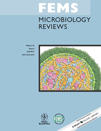
FEMS MICROBIOLOGY REVIEWS
Exploring the Frontiers of Microbial ScienceFEMS Microbiology Reviews, published by Oxford University Press, is a leading journal in the field of microbiology, with a notable impact in related disciplines such as infectious diseases and medicine. Since its inception in 1989, this esteemed journal has grown to occupy a prestigious position, consistently ranking in the first quartile (Q1) in various categories, including Infectious Diseases, Medicine (miscellaneous), and Microbiology. With an impressive Scopus ranking of #13 in Microbiology and #25 in Infectious Diseases, it is recognized for its high-quality and impactful reviews that bridge the gap between fundamental microbiological research and practical applications. Aimed at researchers, professionals, and students alike, FEMS Microbiology Reviews offers critical insights and comprehensive analyses, making it an essential resource for those engaged in the dynamic study of microbial life and its implications for health and disease.
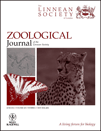
ZOOLOGICAL JOURNAL OF THE LINNEAN SOCIETY
Advancing the frontiers of zoological research.Zoological Journal of the Linnean Society, published by Oxford University Press, stands as a prestigious vessel for scholarly discourse in the fields of Animal Science and Ecology. With an ISSN of 0024-4082 and E-ISSN 1096-3642, this journal has an illustrious history dating back to its inception in 1866, and has consistently contributed groundbreaking research that shapes our understanding of zoology and evolutionary biology. Operating out of the United Kingdom, the journal boasts an impressive Q1 ranking in both Animal Science and Zoology and Ecology, Evolution, Behavior and Systematics, positioning it among the top tier of its category. With a significant presence in the academic landscape, the journal ranks 24th among 490 in Animal Science and 97th among 721 in Ecology, reflecting its impact and relevance in the field. Although it is not an open access journal, the wealth of knowledge it offers is invaluable for researchers, professionals, and students alike, aiding in the advancement of zoological sciences.

ANTONIE VAN LEEUWENHOEK INTERNATIONAL JOURNAL OF GENERAL AND MOLECULAR MICROBIOLOGY
Advancing the Frontiers of Microbial ResearchANTONIE VAN LEEUWENHOEK INTERNATIONAL JOURNAL OF GENERAL AND MOLECULAR MICROBIOLOGY, published by Springer, is a vital resource for advancing research in the fields of microbiology and molecular biology. With its ISSN 0003-6072 and E-ISSN 1572-9699, this journal consistently focuses on cutting-edge studies and developments, providing a platform for the dissemination of knowledge that spans over its rich history from 1934 onwards. The journal holds an impressive reputation, ranked Q2 in Medicine (miscellaneous) and Q3 in both Microbiology and Molecular Biology for 2023, reflecting its significant contribution to the scientific community. Researchers and professionals from various disciplines rely on this journal for quality publications that address complex microbial interactions and molecular mechanisms. Although it currently does not provide open access options, its compelling research remains accessible through institutional subscriptions, allowing it to foster collaborative advancements in the ever-evolving landscape of microbiological sciences.
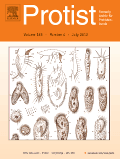
PROTIST
Fostering Global Collaboration in Protist ResearchPROTIST is a leading journal in the field of microbiology, focusing on the diverse and often complex world of protists. Published by Elsevier GmbH in Germany, this academic journal has established itself as a valuable resource for researchers, professionals, and students alike. Covering a wide range of topics within the realm of protistology, including taxonomy, ecology, and evolutionary biology, PROTIST aims to promote the understanding of these essential microorganisms, which play critical roles in ecosystem dynamics and human health. Although it currently holds a Q3 ranking in the 2023 category quartiles for Microbiology, it aspires to elevate its status through high-quality articles and innovative research findings. The journal operates under an open-access model, fostering global dissemination of knowledge and encouraging collaborative research. With its extensive scope—from its convergence starting in 1998 to its anticipated developments through 2024—PROTIST remains a vital platform for advancing the study of protists and their impact on our world.
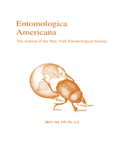
Entomologica Americana
Fostering Insights into Biodiversity and EcologyEntomologica Americana is a pivotal journal in the field of Insect Science, published by the esteemed New York Entomological Society Inc. With its ISSN (1947-5136) and E-ISSN (1947-5144), this journal serves as a critical resource for researchers, professionals, and students dedicated to the study of entomology. Although it is categorized in the Q4 quartile for Insect Science as per the 2023 Scopus Rankings, where it ranks 179 out of 181, it continues to provide valuable insights into various aspects of insect biology, ecology, and conservation. The journal has been actively publishing since its convergence years from 2009 to 2017, and in selected years thereafter, including 2019, 2021, and 2023. Located at the iconic American Museum of Natural History in New York City, Entomologica Americana is a testament to the ongoing exploration and understanding of the insect world that underpins biodiversity and ecosystem health. Although it does not operate under an Open Access model, it offers a vital platform for scholarly communication and the dissemination of research findings, making it indispensable for anyone involved in or entering the fascinating field of entomology.
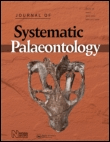
JOURNAL OF SYSTEMATIC PALAEONTOLOGY
Unveiling the Mysteries of Extinct LifeJOURNAL OF SYSTEMATIC PALAEONTOLOGY, published by Taylor & Francis Ltd in the United Kingdom, stands as a premier platform for advancing the discipline of palaeontology. With an ISSN of 1477-2019 and an E-ISSN of 1478-0941, this journal has achieved an impressive ranking of Q1 within its category for the 2023 Scopus metrics, underscoring its significance in the field. Currently ranked #10 out of 113 in Earth and Planetary Sciences – Paleontology with a remarkable 91st percentile, it serves as an essential resource for researchers, professionals, and students alike. The journal aims to publish cutting-edge research that fosters a deeper understanding of systematic palaeontology, including the evolutionary relationships and biodiversity of extinct organisms. While it operates under a traditional access model, the Journal’s expansive reach from its inception in 2003 through to 2024 ensures it continues to play a vital role in shaping the future of palaeontological studies.
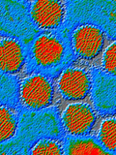
Annual Review of Microbiology
Elevating Microbiology: Where Research Meets InnovationAnnual Review of Microbiology is a preeminent academic journal published by Annual Reviews, specializing in the dynamic field of microbiology. With a rich history dating back to 1948, this journal has become a vital resource for researchers, professionals, and students alike, providing comprehensive reviews that synthesize the latest advancements and trends in microbiological research. The journal is renowned for its impressive reputation, holding a Q1 ranking in both Medicine (miscellaneous) and Microbiology, and achieving an outstanding Scopus rank of #12 out of 182 in the field, placing it in the 93rd percentile. Although it does not offer open access, the Annual Review of Microbiology remains integral to advancing knowledge and understanding of microbial science, helping to bridge the gap between fundamental research and practical applications in health, industry, and environmental sustainability. Its meticulously curated content serves as a crucial platform for fostering innovation and collaboration among the global research community.
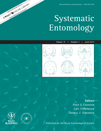
SYSTEMATIC ENTOMOLOGY
Advancing the Frontiers of Insect KnowledgeSYSTEMATIC ENTOMOLOGY is a premier journal published by Wiley, specializing in the field of entomology with a particular focus on insect systematics, ecology, evolution, and behavior. With its strong academic reputation, this journal has achieved a remarkable Q1 ranking in both Ecology, Evolution, Behavior and Systematics and Insect Science categories, affirming its influence and importance in advancing research in these critical areas. SYSTEMATIC ENTOMOLOGY has a broad scope, making it a valuable source for original research, reviews, and methodological advancements that contribute to the understanding of insect biodiversity and systematics. Operating from the United Kingdom, the journal is dedicated to fostering knowledge and innovation within the scientific community, ensuring that high-quality research is accessible to researchers, professionals, and students alike. The journal's consistent publication since 1976 and its continued relevance up to 2024 exemplify its commitment to the field and its readers.
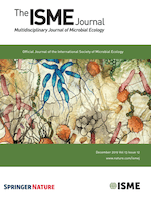
ISME Journal
Advancing knowledge at the intersection of life sciences.The ISME Journal, published by Oxford University Press, stands as a premier multidisciplinary platform dedicated to advancing the fields of Ecology, Evolution, Behavior, and Systematics as well as Microbiology. With its ISSN of 1751-7362 and E-ISSN 1751-7370, this renowned journal has successfully maintained a prestigious reputation reflected in its commendable Q1 rankings across both fields in 2023. It ranks #7 out of 721 in Ecology, Evolution, Behavior, and Systematics and #8 out of 182 in Microbiology, placing it in the top percentiles of relevant Scopus categories. Covering original research, reviews, and methodologies, the journal aims to foster interdisciplinary collaboration and inspire new paradigms in microbiome research, environmental processes, and evolutionary dynamics. Researchers, professionals, and students are encouraged to submit their findings to a journal that not only reaches a global audience but also influences the direction of ongoing scientific discourse. With a commitment to excellence, the ISME Journal represents an essential resource for anyone engaged in these transformative fields of study.

Bangladesh Journal of Plant Taxonomy
Unlocking the secrets of Bangladesh's botanical diversity.Welcome to the Bangladesh Journal of Plant Taxonomy, a leading open-access publication dedicated to advancing the understanding of plant taxonomy in the context of Bangladesh's rich biodiversity. Published by the Bangladesh Association of Plant Taxonomists, this journal plays a crucial role in fostering academic discourse and dissemination of research findings since its establishment. With its ISSN 1028-2092 and E-ISSN 2224-7297, the journal provides a platform for researchers, professionals, and students to share their contributions to plant science. Although it has discontinued its coverage in Scopus from 2018, it remains a valuable resource, evidenced by its rankings in the agricultural and biological sciences categories, including a placement of #330/403 in Plant Science and #515/588 in Ecology, Evolution, Behavior, and Systematics. Open access since 2005, the journal ensures that critical research is freely available to all, supporting the global community in the study and preservation of plant biodiversity.